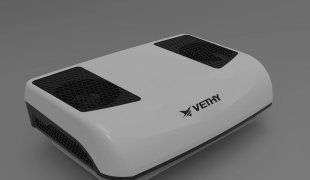The Ultimate Guide to Parking Air Conditioners: Keeping Cool While Parked
September 03, 2025
The Ultimate Guide to Parking Air Conditioners: Keeping Cool While Parked
When it comes to maintaining comfort during extended stops, a parking air conditioner has become an essential piece of equipment for truck drivers, RV enthusiasts, and commercial vehicle operators. Whether you're taking mandatory rest breaks, waiting for cargo loading, or simply want to stay cool without idling your engine, understanding the ins and outs of parking air conditioning systems can make all the difference in your comfort and operational costs.
What is a Parking Air Conditioner?
A parking air conditioner, also known as an auxiliary air conditioning system, is a specialized cooling unit designed to operate independently of your vehicle's main engine. Unlike traditional automotive air conditioning that requires the engine to run, these systems can cool your cab, sleeper, or living space while your vehicle remains parked and turned off.
The primary advantage of parking air conditioner for trucks lies in eliminating the need for engine idling, which not only reduces fuel consumption but also minimizes engine wear and meets anti-idling regulations in many jurisdictions. Modern parking AC systems have evolved significantly, offering reliable cooling performance that rivals traditional engine-driven systems.
Types of Parking Air Conditioners
Electric Parking Air Conditioners
Electric parking ac for semi trucks represents the most environmentally friendly option available today. These systems draw power from your vehicle's battery bank or shore power connection, making them ideal for overnight stops at truck stops with electrical hookups.
12v parking air conditioner for trucks systems are particularly popular among owner-operators who want efficient cooling without the complexity of higher voltage systems. These units typically consume between 40-60 amps, making them suitable for well-equipped electrical systems with adequate battery capacity.
Battery powered parking air conditioner units have gained traction due to advances in lithium battery technology. Modern battery banks can support several hours of cooling operation, especially when combined with solar charging systems.
Diesel Parking Air Conditioners
Diesel parking air conditioner installation offers the advantage of using the same fuel as your vehicle's engine. These systems feature a small diesel burner that powers a cooling cycle, providing both heating and cooling capabilities regardless of external power sources.
Diesel-powered units typically consume between 0.1-0.3 gallons per hour, making them cost-effective for extended use. The installation process requires proper exhaust routing and fuel line connections, but the independence from electrical systems makes them attractive for long-haul operations.
Roof Mounted Systems
Roof mounted parking air conditioning units maximize interior space while providing excellent cooling distribution. These systems are particularly popular in sleeper cabs and recreational vehicles where interior space is at a premium.
Installation typically involves cutting a roof opening and securing the unit with mounting brackets and weatherproof sealing. Professional installation ensures proper drainage and prevents leaks that could damage your vehicle's interior.
Key Features to Consider
Cooling Capacity and BTU Requirements
Understanding parking air conditioner BTU requirements is crucial for selecting the right system. A typical sleeper cab requires between 9,000-13,500 BTUs for effective cooling, while larger spaces may need systems rated up to 18,000 BTUs.
Factors affecting BTU requirements include:
Interior space volume
Insulation quality
Window area and tinting
External temperature conditions
Desired temperature differential
Power Consumption
Parking air conditioner power consumption varies significantly between system types. Electric units typically draw 40-80 amps at 12V, while 24v parking air conditioner specifications often show improved efficiency with current draw around 20-40 amps.
Understanding power requirements helps determine battery bank sizing and charging system capabilities. Solar panels, alternator charging, and shore power connections all play roles in maintaining adequate power supply.
Noise Levels
A quiet parking air conditioner for trucks is essential for quality rest periods. Look for systems with sound ratings below 55 decibels, which is comparable to moderate rainfall. Compressor design, fan speed control, and mounting isolation all contribute to overall noise levels.
Installation Considerations
Professional vs. DIY Installation
Parking air conditioner installation cost varies depending on system complexity and whether you choose professional installation or tackle the project yourself. Professional installation typically ranges from $500-1,500, while DIY installations can save labor costs but require mechanical aptitude and proper tools.
Professional installation ensures:
Proper electrical connections and safety
Correct refrigerant handling
Warranty compliance
Code adherence
Electrical System Requirements
Installing an electric parking air conditioner requires careful evaluation of your vehicle's electrical system. Consider:
Battery capacity and type
Charging system output
Inverter requirements for AC units
Wiring gauge and circuit protection
Mounting and Structural Considerations
Sleeper cab air conditioning system installation must account for vehicle movement and vibration. Proper mounting prevents damage from road shock and ensures reliable operation over thousands of miles.
Comparing Popular Brands
Webasto vs Dometic: A Detailed Comparison
When researching webasto vs dometic parking air conditioner options, several key differences emerge:
Webasto Systems:
German engineering with emphasis on durability
Integrated heating and cooling in many models
Higher initial cost but excellent longevity
Comprehensive dealer network for service
Dometic Systems:
Competitive pricing with good performance
Wide range of BTU ratings available
Strong RV market presence
Extensive parts availability
Other Notable Brands
Parking air conditioner brands comparison should also include:
Carrier: Commercial-grade reliability
Cruisair: Marine-inspired designs
Frost Fighter: Budget-friendly options
Red Dot: Heavy-duty commercial focus
Cost Analysis and Fuel Savings
Initial Investment vs. Long-term Savings
While the upfront cost of a quality parking air conditioner may seem substantial, the fuel savings from reduced idling quickly justify the investment. Consider these factors:
Parking air conditioner fuel consumption: Diesel units use 0.1-0.3 gallons/hour vs. 0.8-1.2 gallons/hour for engine idling
Reduced engine wear and maintenance costs
Compliance with anti-idling regulations
Improved driver comfort and rest quality
Operating Cost Comparison
Truck parking air conditioner vs generator analysis reveals interesting cost dynamics:
Parking AC Advantages:
Lower fuel consumption
Quieter operation
No engine wear during rest periods
Better emissions profile
Generator Advantages:
Can power additional devices
May provide heating options
Sometimes lower initial cost
Maintenance and Troubleshooting
Regular Maintenance Tasks
Proper maintenance ensures reliable performance and extends system life:
Clean or replace air filters monthly
Check refrigerant levels annually
Inspect electrical connections
Clean condenser coils
Verify drain operation
Common Issues and Solutions
Understanding typical problems helps with quick field repairs:
Low cooling performance: Often caused by dirty filters or low refrigerant
High power consumption: May indicate failing compressor or poor insulation
Water leaks: Usually related to blocked drains or poor installation
Excessive noise: Could indicate loose mounting or failing bearings
Energy Efficiency and Environmental Impact
Maximizing Efficiency
Truck parking cooler energy efficient operation depends on several factors:
Proper system sizing for your space
Quality insulation and window treatments
Regular maintenance and clean filters
Appropriate temperature settings
Environmental Considerations
Modern parking air conditioners offer significant environmental benefits compared to engine idling:
Reduced CO2 emissions
Lower NOx and particulate output
Decreased fuel consumption
Compliance with environmental regulations
Choosing the Right System for Your Needs
Best parking ac for overnight trucking
For long-haul drivers requiring reliable overnight cooling, consider:
Diesel-powered units for fuel independence
High-capacity battery systems for electric units
Quiet operation for quality sleep
Proven reliability records
Affordable truck parking air conditioning
Budget-conscious operators should evaluate:
Total cost of ownership including fuel savings
Warranty coverage and service availability
Installation complexity and costs
Financing options available
Future Trends and Technology
Emerging Technologies
The parking air conditioner industry continues to evolve with:
Improved battery technology enabling longer operation
Solar integration for sustainable power
Smart controls for optimal efficiency
Enhanced insulation materials
Regulatory Changes
Increasing anti-idling regulations make auxiliary cooling systems more attractive:
Extended no-idle zones
Higher penalties for violations
Environmental compliance requirements
Fleet efficiency mandates
Warranty and Service Considerations
Parking air conditioner warranty coverage
Understanding warranty terms helps protect your investment:
Typical coverage periods: 1-3 years
Parts vs. labor coverage
Service network availability
Registration requirements
Service Network Importance
Choose brands with established service networks:
Roadside assistance availability
Parts inventory at service locations
Technician training and certification
Mobile service options
Advanced Installation Tips and Best Practices
Optimizing System Performance Through Strategic Installation
Professional installation extends beyond basic mounting and electrical connections. Strategic placement of components significantly impacts both performance and longevity. When installing a sleeper cab air conditioning system, consider air circulation patterns within your specific cab configuration.
The condenser unit benefits from maximum airflow exposure while avoiding direct road debris impact. Many experienced installers recommend mounting condensers slightly angled to promote natural drainage and prevent ice formation during winter storage. For roof mounted parking air conditioning systems, proper sealant application using marine-grade compounds ensures weather resistance over years of highway exposure.
Electrical System Upgrades for Optimal Performance
24v parking air conditioner specifications often require electrical system modifications beyond basic installation. Upgrading to larger gauge wiring reduces voltage drop, improving compressor efficiency and extending component life. Installing a dedicated battery monitor helps prevent over-discharge situations that can damage expensive battery banks.
Consider implementing a battery management system that automatically disconnects loads when voltage drops below safe thresholds. This protection is particularly crucial for battery powered parking air conditioner installations where battery damage from deep discharge can cost thousands in replacement expenses.
Regional Considerations and Climate Adaptation
Desert and Extreme Heat Operations
Operating in southwestern United States or similar extreme climates requires special considerations for parking air conditioner BTU requirements. Standard calculations may underestimate cooling needs when ambient temperatures exceed 110°F regularly. In these conditions, upgrading to systems with 15-20% higher BTU ratings ensures adequate cooling performance.
Enhanced insulation becomes critical in extreme heat applications. Adding ceramic window tinting, reflective roof coatings, and supplemental insulation can reduce cooling loads by 25-30%, extending battery life and improving comfort levels during peak temperature periods.
Cold Weather Adaptations
Diesel parking air conditioner installation provides advantages in cold climates through integrated heating capabilities. However, cold weather operation requires attention to fuel gelling prevention and condensate drainage systems that won't freeze.
Installing fuel line heaters and using appropriate diesel additives prevents fuel system problems during winter operations. Condensate drain systems need freeze protection through either heated drain lines or strategic routing that prevents ice accumulation.
Fleet Management and ROI Analysis
Calculating Return on Investment for Fleet Operations
Fleet managers evaluating affordable truck parking air conditioning options must consider total cost of ownership beyond initial purchase price. Comprehensive ROI analysis includes fuel savings, reduced engine maintenance, driver retention benefits, and regulatory compliance costs.
Industry data suggests that parking air conditioners typically pay for themselves within 18-24 months through fuel savings alone. Additional benefits include reduced engine overhaul intervals, lower insurance costs due to decreased accident risks from fatigue, and improved driver satisfaction leading to reduced turnover.
Driver Training and System Optimization
Maximizing parking air conditioner efficiency requires proper driver education. Training programs should cover optimal thermostat settings, battery management practices, and preventive maintenance procedures. Drivers who understand their system's capabilities can extend operational time and prevent costly repairs through proper usage patterns.
Implementing fleet-wide best practices for parking air conditioner power consumption management can reduce overall operating costs significantly. Simple practices like pre-cooling during driving periods and using window coverings can extend battery-powered operation by several hours.
Emerging Technologies and Future Innovations
Integration with Vehicle Telematics
Modern parking air conditioners increasingly integrate with vehicle telematics systems, providing fleet managers with real-time operational data. These systems monitor power consumption, operational hours, maintenance needs, and efficiency metrics remotely.
Advanced systems can automatically adjust cooling based on weather forecasts, occupancy sensors, and predetermined schedules. This automation optimizes parking air conditioner fuel consumption while ensuring driver comfort without manual intervention.
Solar Integration and Renewable Energy
Solar panel integration with parking air conditioners represents a growing trend toward energy independence. High-efficiency solar arrays can significantly extend operational time, particularly beneficial for electric parking ac for semi trucks installations.
Modern solar charge controllers maximize energy capture through maximum power point tracking technology, ensuring optimal battery charging even under partial shade conditions. Combined with lithium battery technology, solar-integrated systems can provide near-unlimited cooling capability during daylight hours.
Conclusion: Making the Right Choice
Selecting the perfect parking air conditioner requires balancing performance, cost, and operational requirements. Whether you choose a diesel parking air conditioner for fuel independence, an electric parking ac for environmental benefits, or a hybrid system for maximum flexibility, the key is matching system capabilities to your specific needs.
How to cool truck cab while parked effectively comes down to understanding your power requirements, space constraints, and operational patterns. By carefully evaluating these factors against available systems, you can make an informed decision that provides years of reliable cooling comfort while maximizing operational efficiency.
Remember that proper installation, regular maintenance, and understanding your system's capabilities will ensure optimal performance throughout its service life. The investment in a quality parking air conditioner pays dividends in fuel savings, regulatory compliance, and most importantly, driver comfort and safety during mandatory rest periods.
The integration of these advanced technologies continues to push the boundaries of what's possible in auxiliary cooling systems, making parking air conditioners more efficient, reliable, and cost-effective than ever before.





